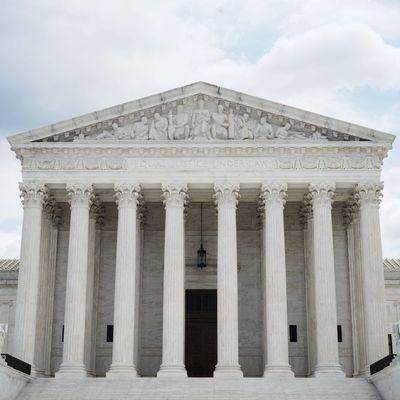
A day after the Supreme Court closed its 2020–2021 term with two decisions that irked progressive voting-rights and anti-corruption advocates, the Court continued to shape its docket for the next term, with orders on cases it will and will not hear. The final order list had an unusual number of rulings in which justices felt the need to express agreement or disagreement. But perhaps the most noteworthy case came down without comment:
ARLENE’S FLOWERS, INC., ET AL. V. WASHINGTON, ET AL. The petition for a writ of certiorari is denied. Justice Thomas, Justice Alito, and Justice Gorsuch would grant the petition for a writ of certiorari.
Behind this bland notice was a battle over whether, where, and when the Court’s conservative majority will choose to expand its “religious liberty” jurisprudence to give religious conservatives a license to discriminate against those whose lifestyles they disdain (loving the sinner, of course, if not the sin). In the 2018 Masterpiece Cakeshop decision, the Supreme Court upheld the right of a conservative Christian baker in Colorado to refuse his cake-making services to a same-sex couple. Subsequently, the Court accepted a case in which a florist was held in violation of a Washington State law banning discrimination against LGBTQ people by businesses selling goods and services to the general public. The Supreme Court sent the case back to the state court with instructions to reconsider the facts in light of Masterpiece Cakeshop, and it did so holding that the kind of hostility to conservative religious views exhibited by Colorado authorities was not present in the Washington case. The florist appealed, and six justices declined to review the state court’s decision.
Presumably Justices Clarence Thomas, Samuel Alito, and Neil Gorsuch — clearly emerging during this last term as the hard core of the Court’s conservative majority — wanted to take the case and perhaps carve out some new ground for those seeking a safe zone for religion-based bigotry. But it fell short of the four justices required to grant certiorari. Not for the first time this term, the decision showed Justices Brett Kavanaugh and Amy Coney Barrett joining Chief Justice John Roberts in splitting with the other conservatives. But as the Court demonstrated the day before, a solid conservative bloc in really consequential cases is still more than possible.
As it happens, the Court did on the same day act on a different “religious liberty” case involving an environmental regulation being challenged by Amish farmers (Mast v. Fillmore County). The Supreme Court sent the case back to state court with instructions to reconsider a decision to enforce a requirement that the technology-averse farmers install certain septic systems, in light of its Fulton v. City of Philadelphia decision earlier this term that struck down a regulatory ruling adverse to a Catholic social-service agency. And it also agreed to hear Carson v. Makin, a challenge to a Maine program providing tuition assistance to private-school students but denying it to those attending schools providing religious instruction, in light of last year’s Espinosa decision on a similar case involving a Montana ban on state subsidies for religious institutions.
There were some other cases in the final order list in which justices felt the need to express objections to decisions against accepting cases. In Berisha v. Lawson, Justices Thomas and Gorsuch complained that the Court passed up an opportunity to revise or reverse the long-standing precedent governing defamation cases brought by public figures in New York Times v. Sullivan. And in Dunn v. Reeves, the Court’s three liberals dissented from a rejection of an appeal by a convicted murderer based on right to counsel considerations, with Justice Sonia Sotomayor writing: “The lengths to which this Court goes to ensure that Reeves remains on death row are extraordinary.”
The biggest dog that did not bark as the Supreme Court begins its summer recess was the absence (so far) of any indication that any justice is about to retire. Eighty-two-year-old Stephen Breyer has been under considerable pressure from progressive activists to hang it up to ensure the Biden administration can nominate a younger successor (a Black woman, in fact, as the president has pledged) while Democrats still control the Senate. It appears he and his colleagues will stick around for a 2021–2022 term that could be very consequential, with major cases involving abortion, guns, and affirmative action, along with the new cases accepted today.






























